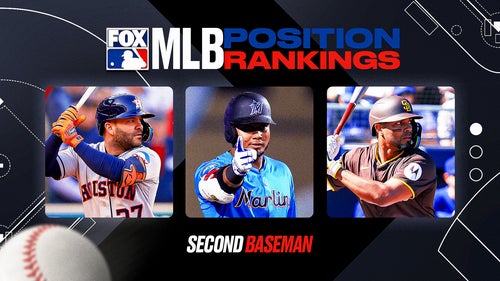
The best (and worst) Aprils for every team and what we learn from the cruelest month
Does April baseball matter? Presently, anxious fans of the Cardinals, Mariners and Blue Jays are hoping their teams’ slow starts augur little, while fans of the Twins, Diamondbacks and Reds are dreaming that analysts’ preseason pessimism had little basis in fact. It is, Eliot wrote, the cruelest month. “What are the roots that clutch, what branches grow, out of this stony rubbish? Son of man, you cannot say, or guess, for you know only a heap of broken images.” What better term to describe outcomes like Phillies 17, Nationals 3
The obvious thing to say is that April games count as much as the rest of the games do; any team that has a good April has a leg up on the competition when the calendar turns to May, and any team that struggles digs itself a deeper hole for the rest of the year. The other obvious thing to say is that any club consisting of fearsome hitters and stingy pitchers (providing that, over the course of a long season, they live up to their reputations) can survive a month of bad luck, while any team full of hackers and meatballers (providing that, over the course of a long season, they live down to their reputations) will not be able to extend its good fortune through the summer. Which is to say: Of course April matters, unless it doesn’t.
Well, then, how much does April matter? In search of the answer, I went spelunking in baseball-reference.com’s ever-invaluable Play Index for each franchise’s best and worst 25-game starts. (Time was, teams’d play five or 10 games in April—shorter seasons and doubleheaders and all—but these days a full April comes out more or less to 25 games.) For simplicity’s sake, I limited the seasons in question to 1903 and onward (the World Series era), and considered a franchise’s past in a previous city as part of its history.
Lo and behold, I found that great Aprils will with some frequency produce great seasons. Four times the Yankees have started 20-5, and each time they have made the World Series, winning three times. The Mariners started 2001 with a 20-5 run; they finished with 116 wins, tied for the the most in MLB history. The 1955 Brooklyn Dodgers began 22-3; they finished 98-55 with their only world title. The ’86 Mets had the best start in franchise history at 20-5 and then went on to win 88 more games and the World Series. Only four times has a team’s franchise-best 25-game start resulted in an under-.500 record: the 1912 Reds, '95 Phillies, 2009 Blue Jays and '11 Marlins. (Those Blue Jays and Marlins teams have in common that they were managed by men in their second stints with the club after winning championships—Cito Gaston and Jack McKeon—but as far as I can tell they had no players in common.)

Likewise, horrendous Aprils will forecall dark years—the 2003 Detroit Tigers started 3-22 and finished 43-119, just short of the worst record ever, while the 1932 Red Sox had 21 losses in their first 25 games and then lost 90 of the next 129. The ’88 Orioles had the worst 25-game start ever, at 2-23—manager Cal Ripken, Sr. was fired six games into the 21-game losing streak that kicked off the season—and their end-of-season winning percentage wound up only the 49th-worst in big-league history. That’s how you make in-season adjustments!
Indeed, if you take all the best/worst outlier seasons (they’re listed below), and run a linear regression for each of the two sets, you will find that the positive relationship between a team’s April record and its end-of-season record is somewhat stronger for the hot starts than the bad ones. Which is to say, if your team gets off to an epically bad start, the full season may very well wind up being only a little bit bad. Hell, the 1973 Cardinals turned a 5-20 start into an 81-81 finish (though they blew a three-game NL East lead in September and finished a game behind the division-winning Mets), and the ’86 Reds went from 6-19 to 86-76 in Pete Rose’s final season as player-manager. (Cincinnati was 34-38 in games Rose played. He retired in August.)
The strongest correlation between a team’s record in its first 25 games and its record at the end of the season, though, occurs when looking not at unusual starts but at usual ones. Great starts can lead to great seasons, bad starts can lead to bad seasons, average starts often lead to average seasons. Armed with this knowledge, what do we do? Well, we keep watching, just in case this time is different.

Best 25-game start: 18-7 (2008). Result: 82-80, missed playoffs.
Worst 25-game start: 7-18 (1998, 2014). Results: 65-97 (1998); 64-98 (2014).
Best 25-game start: 19-6 (1997, 2000). Results: 101-61, lost NLCS (1997); 95-67, lost NLDS (2000).
Worst 25-game start: 6-19 (1988, 2016). Results: 54-106 (1988); 68-93 (2016).
Best 25-game start: 18-7 (1997). Result: 98-64, lost ALCS.
Worst 25-game start: 2-23 (1988). Result: 54-107.
Best 25-game start: 21-4 (1946). Result: 104-50, lost World Series.
Worst 25-game start: 4-21 (1932). Result: 43-111.
Best 25-game start: 21-4 (1907). Result: 107-45, won World Series.
Worst 25-game start: 6-19 (1962, '66, '97). Results: 59-103 (1962); 59-103 ('66); 68-94 ('97).
Best 25-game start: 19-5 (1912). Result: 78-76, missed World Series.
Worst 25-game start: 6-19 (1942). Result: 66-82.
Best 25-game start: 20-5 (1912). Result: 75-78, missed World Series.
Worst 25-game start: 6-19 (1931, '34, '50, '86). Results: 58-96 (1931); 52-99 ('34); 66-87 ('50); 86-76 ('86).

Best 25-game start: 19-6 (1966). Result: 81-81, missed playoffs.
Worst 25-game start: 4-21 (1969). Result: 62-99.
Best 25-game start: 18-7 (1997). Result: 83-79, missed playoffs.
Worst 25-game start: 6-19 (2005). Result: 67-95.
Best 25-game start: 21-4 (1911, '84). Results: 89-65 (1911), missed World Series; 104-58 ('84), won World Series.
Worst 25-game start: 3-22 (2003). Result: 43-119.
Best 25-game start: 18-7 (2015). Result: 86-76, lost ALDS.
Worst 25-game start: 5-20 (1969). Result: 81-81.
Best 25-game start: 17-8 (1989, 2003). Results: 92-70, missed playoffs (1989); 83-79, missed playoffs (2003).
Worst 25-game start: 5-20 (1992, 2006). Results: 72-90 (1992), 62-100 (2006).
Best 25-game start: 17-8 (1982). Result: 93-69, lost ALCS.
Worst 25-game start: 9-16 (1961, '69, '76, '94, 2013)). Result: 70-91 (1961), 71-91 ('69), 76-86 ('76), 47-68 ('94), 78-84 (2013).

Best 25-game start: 22-3 (1955). Result: 98-55, won World Series.
Worst 25-game start: 6-19 (1911). Result: 64-86.
Best 25-game start: 16-9 (2011). Result: 72-90, missed playoffs.
Worst 25-game start: 5-20 (1995). Result: 67-76.
Best 25-game start: 20-5 (1987). Result: 91-71, missed playoffs.
Worst 25-game start: 5-20 (1970). Result: 65-97.
Best 25-game start: 19-6 (1932). Result: 93-61, missed World Series.
Worst 25-game start: 6-19 (1957). Result: 55-99.
Best 25-game start: 20-5 (1986). Result: 108-54, won World Series.
Worst 25-game start: 6-19 (1964). Result: 53-109.
Best 25-game start: 20-5 (1928, '39, '58, 2003). Results: 101-53, won World Series (1928); 106-45, won World Series ('39); 92-62, won World Series ('58); 101-61, lost World Series (2003).
Worst 25-game start: 7-17-1 (1913). Result: 57-94-2.
Best 25-game start: 20-5 (1925, '81). Results: 88-64, missed World Series (1925); 64-45, lost ALCS ('81).
Worst 25-game start: 5-20 (1965). Result: 59-103.

Best 25-game start: 19-6 (1911, '93, '95). Results: 79-73, missed World Series (1911); 97-65, lost World Series (1993); 69-75, missed playoffs (1995).
Worst 25-game start: 5-20 (1928). Result: 43-109.
Best 25-game start: 19-6 (1921). Result: 90-63, missed World Series.
Worst 25-game start: 5-20 (1952). Result: 42-112.
Best 25-game start: 18-7 (1998). Result: 98-64, lost World Series.
Worst 25-game start: 6-19 (1987). Result: 65-97.
Best 25-game start: 20-5 (2001). Result: 116-46, lost ALCS.
Worst 25-game start: 6-18-1 (1981). Result: 44-65-1.
Best 25-game start: 22-3 (1907). Result: 82-71, missed World Series.
Worst 25-game start: 8-17 (1980, '84). Results: 75-86 (1980), 66-96 ('84).
Best 25-game start: 19-6 (2015). Result: 100-62, lost NLDS.
Worst 25-game start: 5-20 (1973). Result: 81-81.
Best 25-game start: 18-7 (2010). Result: 96-66, lost ALDS.
Worst 25-game start: 8-17 (2001, '05). Results: 62-100 (2001), 67-95 ('05).
Best 25-game start: 18-7 (1989, '98). Results: 83-79, missed playoffs (1989); 88-74, lost ALDS (1998).
Worst 25-game start: 6-19 (1962). Result: 60-101.
Best 25-game start: 16-9 (1992, 2001, '09). Results: 96-66, won World Series (1992); 80-82, missed playoffs (2001); 75-87, missed playoffs ('09).
Worst 25-game start: 7-18 (1979). Result: 53-109.
Best 25-game start: 18-7 (1979, 2016). Results: 95-65, missed playoffs (1979); 95-67, lost NLDS (2016).
Worst 25-game start: 5-20 (2004). Result: 67-95.



